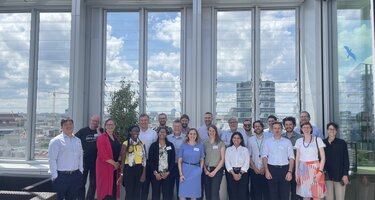Successful DIASCA Workshop
This event brought together 35 experts from various sectors (international organizations, EU, BMZ, IT companies, private sector, NGOs) to work together on a vision for a sustainable digital infrastructure and to exchange views on DIASCA activities for the next three years.
Background and objectives
The DIASCA initiative is committed to improving the digital public infrastructure (DPI) in agriculture, especially in agricultural supply chains, so that all actors, especially smallholder farmers, benefit from better access to data and interoperability of software solutions. The workshop aimed to develop a comprehensive vision, identify and discuss use cases for DPI, and develop a roadmap for the next phase of DIASCA.
Agenda and objectives of the workshop
The workshop focused on the following topics:
- Shared vision for DPI by 2030: The participants worked in working groups to develop their "Vision 2030" for a digital public infrastructure in agriculture.
- Inventory and prioritization: Existing digital and data-related activities of the respective organizations present were collected and common thematic and geographical priorities were identified.
- Identification and discussion of DPI “use cases”: Working groups dealt with specific DPI use cases, such as the implementation of the EU Deforestation Regulation (EUDR), or future requirements for the digital implementation of new regulations, such as the European Supply Chain Directive (CSDDD).
- Role of DIASCA and cooperation: Central to the discussion was the future role of DIASCA and how an effective governance structure, good cooperation and possible co-financing mechanisms can be designed.
Key results and findings
The workshop highlighted the need to improve the availability and quality of public data. Participants emphasized the importance of data being transparent and easily accessible in order to create trust and facilitate its use.
In the area of technological building blocks, challenges such as isolated data silos or the multiple collection of the same data by different actors and the need for practical applications were identified.
Identifiers and open standards were considered necessary to ensure the smooth integration and use of data. The standardization of registers (as opposed to closed databases) and the promotion of open standards were named as key aspects for harmonizing the digital landscape.
Incentives and business models were identified as key to promoting DPI in agriculture. It was discussed that economic incentives and the removal of barriers, but also sustainable business models for open-source solutions should be created to support the adaptation and integration of new technologies.
Outlook and next steps
The workshop report is now available for download. New partners are always welcome to participate in the further design and implementation of the digital infrastructure and to get in touch with us with their ideas.
Contact: diasca@giz.de
